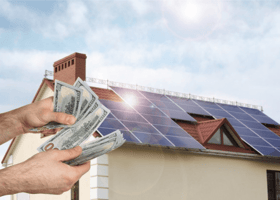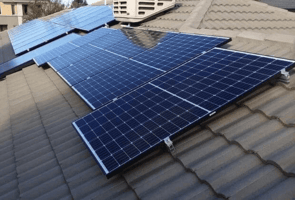Depending on your energy usage, climate, type of home or apartment you live in, and more–your monthly electricity cost could be different than your neighbors.
As experts in energy solutions for homeowners and businesses throughout Minnesota and beyond, Wolf River Electric is here to help with all your questions about electric bills. Whether you’re a lifelong Minnesotan looking for ways to save money or a new resident trying to budget accordingly—we have all the answers so that you can make an informed decision about how much energy you use each month. Read for tips to go solar and save money.
The Cost Of Electricity Bill In Minnesota

Average Residential Electricity Rate & Consumption In Minnesota
As of 2023, the average residential rates in Minnesota is around 13.4 cents per kilowatt-hour (kWh). Residential energy consumption varies widely depending on factors such as household size, climate, and energy-efficient practices. On average, Minnesota residents consume around 675 kWh per month.
Average Commercial Electricity Rates & Consumption In Minnesota
Minnesota’s Commercial electricity rates vary based on business size, industry, and electricity usage patterns. To date, commercial rates average around 10.5 cents per kWh.
Overall, commercial average electricity consumption varies significantly depending on the type of business, facility size, operational hours, and energy management strategies.
Go Solar Today!
Factors Affecting Electric Bills In Minnesota

Electricity Rates
The rate, established by the state legislature, is subject to fluctuations based on market demand and generation cost. In addition, different power companies offer a variety of rates and plans within a single region, making it important for consumers to shop around and find the best rate for their energy needs.
Energy Consumption
While some areas of the state have comparatively low electricity prices, high-energy consumption can still lead to significant costs over time. Understanding how much energy your home or business uses and taking steps to decrease consumption can help you save money on electric bills.
Seasonal Variations
Minnesota experiences distinct seasonal temperature variations, leading to energy usage fluctuations. During hot summer months or cold winter months, increased reliance on air conditioning, heating, and ventilation systems can significantly impact electric bills due to higher energy consumption.
Housing Type and Size
Single-family homes typically use more electricity than apartments or condominiums of comparable size. Larger homeowners expect more electricity to heat or cool the space.
What To Do About High Bills
Home Weatherization And Insulation
Home weatherization and insulation can help reduce your energy bills. Insulating windows, walls, roofs and other parts of the home will prevent cold air from entering in winter, and hot air from escaping during summer. This helps maintain a comfortable temperature year round while using less energy.
Using Smart Home Technology
Smart home technologies like thermostats, lighting controls, window coverings, and appliances can help reduce high energy bills by automatically adjusting to conditions in your home. For example, a smart thermostat can detect when temperatures are too high or low for comfort and adjust accordingly, while a smart plug can be used to turn off lights or appliances when not in use.
Taking Advantage Of Energy-Saving Programs And Rebates
Many local governments and utility companies offer energy-saving programs and rebates to help reduce high bills. These programs may include free home energy audits which identify potential areas of improvement and provide tips on how to increase efficiency and reduce energy costs.
Install Solar Panels
Installing solar panels on your home can significantly reduce your electric bill by providing clean, renewable energy free from your utility company. Depending on the size of the system and local incentives, solar panels can help you save up to thousands of dollars a year. Some utility companies may credit you for unused energy if you have excess power generated from your system
Final Thought: Reduce Your Electric Bill In MN With Solar

Reducing your electric bill in Minnesota by using solar energy is a great way to save on utility costs. It’s not only environmentally friendly but it can also help lower your overall energy bills. Also, there are often state and federal tax credits that you can take advantage of when installing a solar energy system. Many companies offer financing to make it easier for homeowners to add an efficient and cost-effective solar system to their home or business.
With all of these considerations in mind, it is worth looking into the potential savings of utilizing renewable energy sources such as solar in Minnesota.
FAQs
How Much Can You Save On Electric Bills With Community Solar In Minnesota?
The amount you save on your electric bills with community solar in Minnesota depends on how much electricity you use and the installation size. Averagely, customers save approximately 10-15% off their electric bills with a large enough solar array.
Will I Still Have An Electric Bill With Solar Energy In MN?
Yes, even with solar energy in Minnesota, you may still have an electric bill. While solar energy can significantly reduce your electricity costs, factors such as the size of your solar system, energy consumption, and net metering policies affect whether you completely eliminate your electric bill.
How Do Electric Rates In Minnesota Compare To The National Average Rate?
Electric rates in Minnesota are slightly higher than the national average but still remain competitive with other states. The median price of electricity in Minnesota is 15 cents per kilowatt hour, compared to the national average of 13 cents per kilowatt hour.
Are There Any Specific Time-Of-Use Rates In Minnesota?
Yes, some utility companies in Minnesota offer time-of-use (TOU) rates. TOU rates involve varying electricity prices based on the time of day. Off-peak hours typically have lower rates, while peak hours have higher rates.
What is the average monthly electric bill for a small apartment in Minnesota?
The average monthly electric bill for a small apartment in Minnesota is typically around $50 – $75 per month. This number will obviously depend on how much electricity you are using and the rate your utility charges, but it is a good starting point to estimate your costs.
Join Our Solar Community
Get exclusive access to the latest solar news, tips, and promotions!


